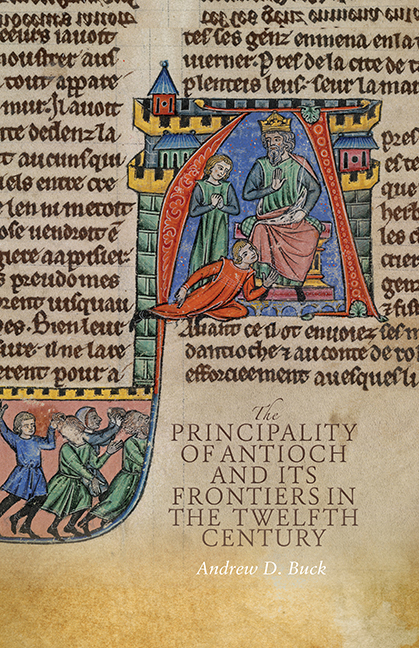Book contents
- Frontmatter
- Contents
- List of Maps
- Acknowledgements
- Abbreviations
- Introduction
- 1 The Extent of the Principality
- 2 The Rulers of Antioch
- 3 Central Governance and Military Service
- 4 Lordship in the Principality
- 5 A Frontier Society? The Nature of Intercultural Relations
- 6 Relations with Byzantium
- 7 Antioch and the Latin East
- Conclusion
- Bibliography
- Index
6 - Relations with Byzantium
Published online by Cambridge University Press: 09 May 2017
- Frontmatter
- Contents
- List of Maps
- Acknowledgements
- Abbreviations
- Introduction
- 1 The Extent of the Principality
- 2 The Rulers of Antioch
- 3 Central Governance and Military Service
- 4 Lordship in the Principality
- 5 A Frontier Society? The Nature of Intercultural Relations
- 6 Relations with Byzantium
- 7 Antioch and the Latin East
- Conclusion
- Bibliography
- Index
Summary
When the leaders of the First Crusade reneged on an agreement to return Antioch and other former imperial possessions to Emperor Alexios I Komnenos in 1098, they set the soon-to-be-formed principality of Antioch on a collision course with Byzantium – a power which had held much of this region until the second half of the eleventh century. The relationship which developed from this is one of the most important for an understanding of the complicated diplomatic challenges faced by Antioch's ruling elites. Before 1130, it was characterised by frequent bouts of armed conflict which even threatened to fragment the crusader states. Imperial hopes of recovering Antioch were continually thwarted, however, despite Alexios forcing Bohemond I, in 1108, to agree to the Treaty of Devol – which reportedly recognised Greek authority and relegated the prince to satellite status. Indeed, Tancred, now de facto prince, refused to recognise the terms whenever Alexios pushed for his rights, including after Bohemond's death in 1111. A brief period of silence followed the emperor's demise in 1118, but imperial interest was renewed with Bohemond II's death. Over the next five decades, Byzantine rulers thrice visited Antioch, frequently offered direct or indirect military support and even forged a number of marriage alliances with the Latins. More significantly, the notion of imperial overlordship – so fervently opposed by the early princes – was now openly discussed, and, during a visit to Antioch by Manuel Komnenos in 1158, finally implemented.
The connection between Antioch and Byzantium has attracted considerable scholarly interest. For the most part, this has focused on the imperial perspective – most prominently the notion that the emperors preferred recognition over possession – or propagated a narrative of conflict emphasising instances of tension. On those occasions when the Antiochene perspective is assessed, two distinct themes emerge: first, that the actions of Frankish rulers and nobles were permanently influenced by an inherent dislike of the Greeks; and, second, that the political changes which occurred in northern Syria during this period left the principality a mere passenger to the desires of both Byzantium and the kingdom of Jerusalem.
- Type
- Chapter
- Information
- Publisher: Boydell & BrewerPrint publication year: 2017



